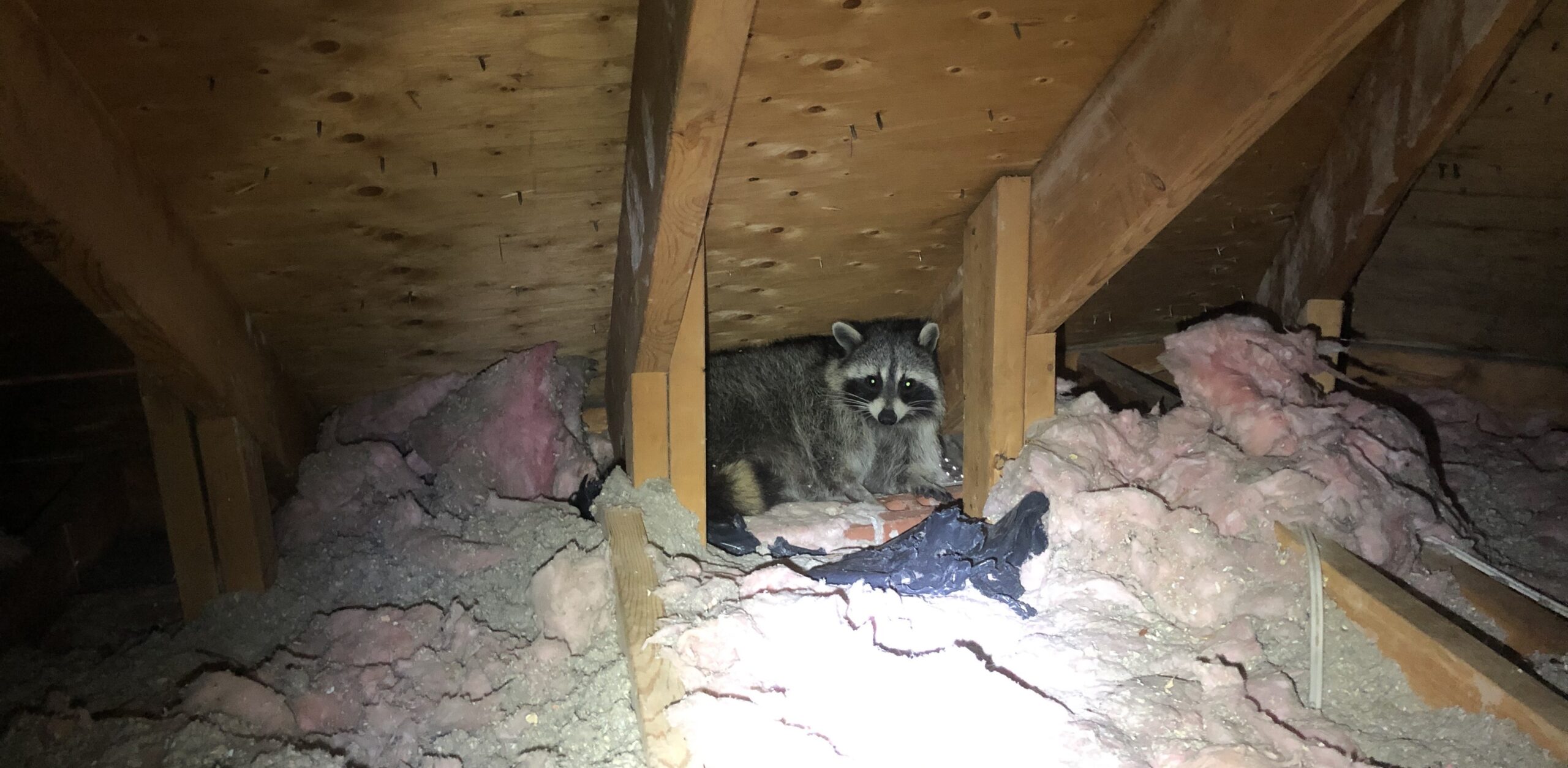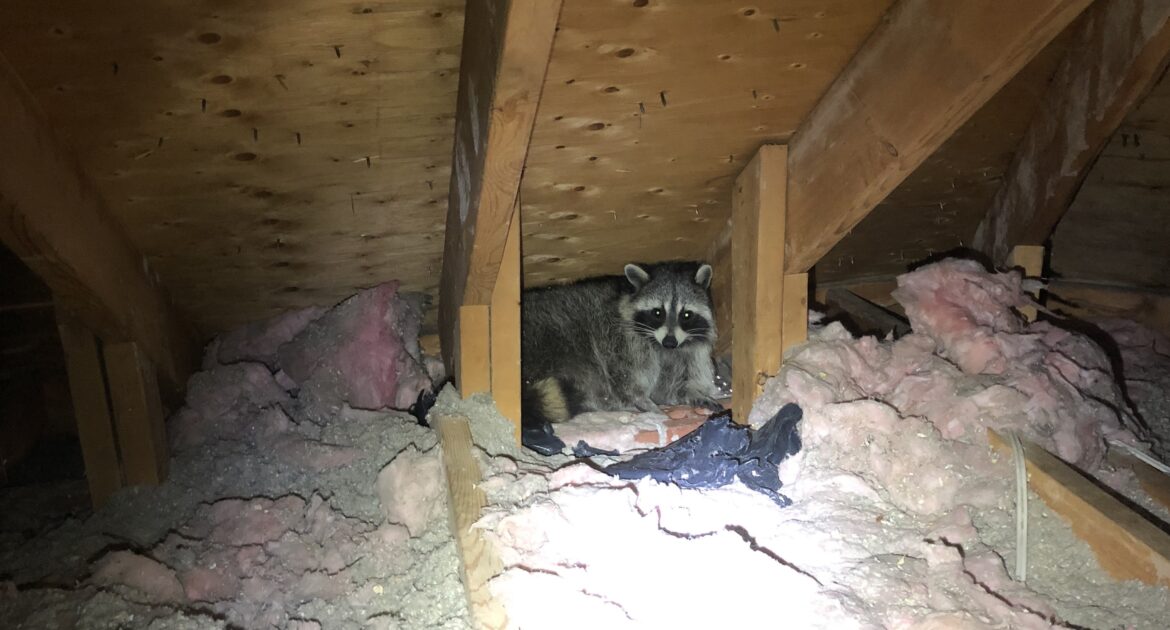You hear your dog barking wildly at the back door. When you look outside, you see a raccoon rummaging through your garbage.
It’s a common sight in Pickering, but it raises an important question: can a raccoon harm your pet?
The answer is yes. Raccoons can pose serious dangers to pets, especially smaller animals like cats and small dogs. With sharp claws, strong teeth, and the ability to carry diseases, these animals are more than just a backyard nuisance.
You want to keep your furry family members safe, and that’s where we come in. At Skedaddle Humane Wildlife Control, we specialize in Pickering raccoon control to protect pets from raccoons and the risks they bring.
From physical confrontations to the spread of diseases, raccoon dangers to pets are real. But don’t worry—there are ways to keep your pets safe and your home raccoon-free.
Let’s explore how raccoons can threaten your pets and what steps you can take to protect them.
How Raccoons Can Threaten Your Pet’s Safety
They might look cute and cuddly, but they’re wild animals with wild instincts. Your pet could face several threats when encountering these masked animals.
Direct Physical Confrontations
When raccoons feel trapped or threatened, they fight back with everything they have. Their sharp claws can cause deep wounds, and their teeth can deliver painful bites. A cornered raccoon becomes extremely aggressive and dangerous.
Small dogs and cats face the biggest risk during these encounters. A large raccoon can weigh up to 40 pounds and has the strength to seriously injure a smaller pet. Even friendly pets who approach raccoons out of curiosity can quickly find themselves in a dangerous situation.
Disease Transmission Risks
Raccoons carry several diseases that can spread to your pets:
- Rabies: This deadly virus affects the brain and nervous system
- Raccoon roundworm: Parasites that can cause serious health problems
- Leptospirosis: A bacterial infection that damages organs
- Distemper: A viral disease that affects dogs and cats
These diseases don’t always show obvious symptoms in raccoons, making infected animals especially dangerous. Your pet doesn’t need to be bitten to catch these illnesses. Simple contact with droppings or contaminated areas can spread disease.
Food Competition and Territorial Behaviour
Raccoons are opportunistic feeders who will eat pet food left outside. When your cat or dog tries to eat from their own bowl, a raccoon might see this as competition. This territorial behaviour can lead to fights, especially during mating season when raccoons become more aggressive.
Pet food left on porches or in yards attracts raccoons and creates the perfect setup for dangerous encounters. Once they know where to find easy meals, they keep coming back.
When Raccoons Become Most Dangerous to Pets
Understanding when these animals pose the greatest threat helps you better protect your pets from harm.
Nighttime Activity Patterns
Raccoons are nocturnal animals, meaning they’re most active when the sun goes down. This creates problems for pet owners who let their cats or dogs outside during evening hours. Your pet might stumble across a raccoon family while they’re searching for food or returning to their den.
Many pet-raccoon encounters happen between dusk and dawn when both animals are moving around your property. Indoor pets stay much safer during these high-risk hours.
Breeding and Nesting Seasons
Spring brings baby raccoons, and their mothers become extremely protective during this time. A female with babies nearby will attack anything she sees as a threat to her young ones. Your innocent pet could trigger this protective instinct just by walking too close to a den.
Females often nest in:
- Attics and roof spaces
- Sheds and garages
- Under porches and decks
- Hollow trees near homes
Winter Desperation
When food becomes scarce in winter, these animals take bigger risks to find meals. They might venture out during daylight hours or approach areas they normally avoid. Hungry raccoons are more likely to fight over food sources, including pet food.
Signs That Raccoons Are Near Your Property
Recognizing raccoon activity early helps you take steps to protect your pets before dangerous encounters happen.
Physical Evidence Around Your Home
Keep an eye out for these warning signs:
- Garbage cans knocked over or lids removed
- Pet food bowls emptied overnight
- Small hand-like prints in mud or soft soil
- Damage to bird feeders or garden plants
- Strange noises in attics, walls, or under porches
Droppings look similar to small dog waste but often contain undigested food pieces like berries or seeds. Never touch or clean up waste yourself, as this can expose you to dangerous parasites and diseases.
Behavioural Changes in Your Pets
Your pets often sense raccoon presence before you do. Watch for these behaviour changes:
- Excessive barking or hissing at night
- Reluctance to go outside after dark
- Nervousness around specific areas of your yard
- Scratching or pawing at doors and windows
Trust your pet’s instincts. If they’re acting scared or agitated in certain areas, investigate further or contact wildlife control professionals.
Size Matters: Which Pets Face the Greatest Risk
Not all pets face equal danger from raccoons. Understanding your pet’s vulnerability helps you make better protection decisions.
Small Dogs and Puppies
Dogs weighing less than 20 pounds face the highest risk from raccoon attacks. Toy breeds, puppies, and elderly dogs can’t defend themselves effectively against a determined raccoon. These small pets can suffer serious injuries or even death from raccoon encounters.
Small dogs often show fearless attitudes that get them into trouble. They may bark at or chase raccoons without understanding the danger they’re facing.
Cats and Kittens
Outdoor cats encounter raccoons frequently since both animals are active at night. While cats are quick and agile, they can still be overwhelmed by larger raccoons, especially if cornered. Kittens and senior cats face the greatest danger due to their size and reduced ability to escape.
Indoor cats stay much safer, but they can still be at risk if raccoons enter your home through pet doors or damaged screens.
Larger Dogs
Big dogs usually fare better in raccoon encounters due to their size and strength. However, they’re not immune to disease transmission or injuries from raccoon claws and teeth. Large breeds may also be more likely to chase these animals, potentially cornering them and triggering aggressive responses.
Health Concerns Beyond Physical Injuries
The raccoon dangers to pets extend beyond scratches and bites. Disease transmission poses serious long-term health risks that can be expensive and difficult to treat.
Immediate Health Responses
If your pet encounters a raccoon, watch for these warning signs:
- Open wounds or puncture marks
- Limping or difficulty moving
- Changes in appetite or behaviour
- Fever or lethargy
- Vomiting or diarrhea
Contact your veterinarian immediately if you notice any of these symptoms, even if the encounter seemed minor.
Long-Term Disease Monitoring
Some diseases carried by raccoons don’t show symptoms right away. Your vet may recommend:
- Blood tests to check for infections
- Stool samples to detect parasites
- Updated vaccinations as prevention
- Regular check-ups to monitor your pet’s health
Early detection and treatment of raccoon-transmitted diseases can save your pet’s life and prevent serious complications.
Protecting Your Pets From Raccoon Dangers
Keeping your pets safe from raccoons starts with making your home and yard less inviting to these animals. At Skedaddle Humane Wildlife Control, we’re here to help you take the right steps to protect your furry family members. Here’s how we can assist:
Securing Food Sources
Raccoons are drawn to easy meals, so we’ll help you eliminate food sources that attract them:
- We’ll ensure garbage cans are secured with tight-fitting lids.
- Pet food bowls left outside? We’ll advise on proper storage solutions.
- Bird feeders causing issues? We can recommend wildlife-proof designs.
- Fallen fruit from trees? We’ll help identify areas that need regular cleanup.
Modifying Outdoor Spaces
Your yard can be a raccoon’s dream hideout. We’ll work with you to make it less appealing:
- Installing motion-activated lights near pet areas.
- Clearing brush piles and debris where they might hide.
- Trimming tree branches that give them access to your roof.
- Securing compost bins to keep them out.
Adjusting Pet Routines
Your pet’s habits can also play a role in reducing risks. We’ll guide you on safer routines:
- Keeping pets indoors during high-risk nighttime hours.
- Supervising outdoor time, especially at dawn and dusk.
- Installing pet doors that only open for your animals.
- Creating secure outdoor runs or kennels for supervised outdoor time.
With Skedaddle’s expertise, you don’t have to face these challenges alone. We’ll help you implement these changes and ensure your home is a safe space for your pets.
Your Pet’s Safety Starts With Professional Help
The raccoon dangers to pets are serious, but you don’t have to face them alone. Professional raccoon control services provide the expertise and tools needed to protect pets from raccoons effectively. At Skedaddle Humane Wildlife Control, we understand how important your pets are to your family.
Our one-way door systems solve problems without putting your pets at additional risk. We handle all the dangerous cleanup work, so you don’t have to worry about disease exposure. When raccoons threaten your pet’s safety, professional help makes all the difference.
Don’t wait until a dangerous encounter happens. Request an estimate today to learn how we can make your Pickering home safer for your beloved pets. Your furry family members deserve protection from wildlife dangers, and we’re here to provide it.




